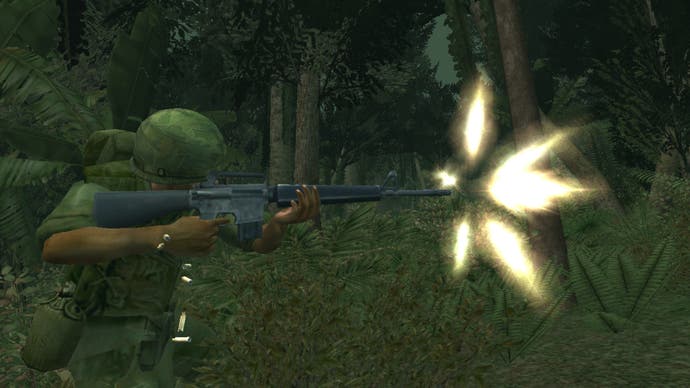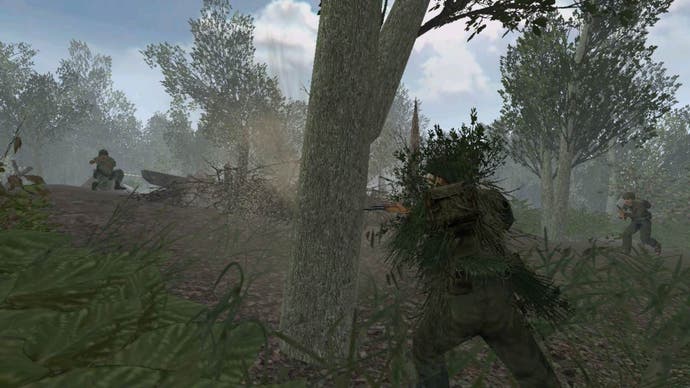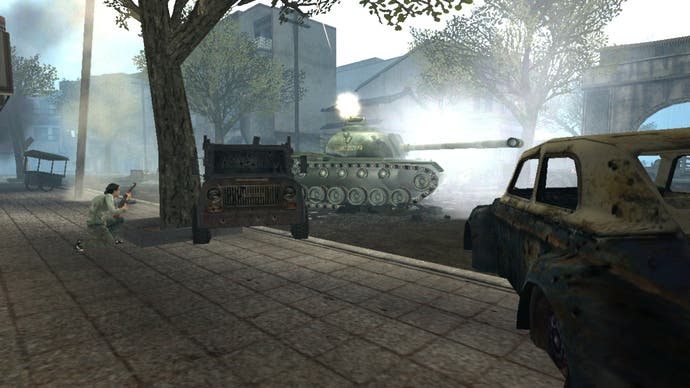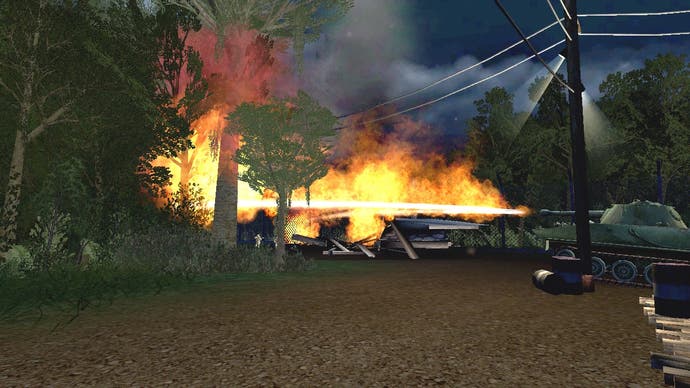Men of Valor: The Vietnam War
2015 returns with a point to prove, and a new war to wage.
Men of Valor is pointless. Not in the sense that it's useless, stupid or inane, but in the literal sense. It has no point to make. Vietnam movies always seemed to have some overarching angle on the whole conflict, using the relationships and events on-screen as a vessel for debating certain issues visually - as well as telling a story. According to developer 2015, Men of Valor is largely narrative and action, and wrapped up in historical research and observation, not politics. And although we're still longing to see one of the developers tackling these conflicts really delve into the thinking as much as trying to entertain the gamer, our experiences with Men of Valor suggest that it will tackle the latter obligation with much gusto. We certainly enjoyed playing it.
War games

Split into several scenarios taken from different points during the war (including Operation Starlite, Da Nang and, later, the Tet Offensive), it's what you might describe as a fairly standard war-based first-person shooter, with a few nice ideas of its own, and compelling, neatly scripted set-ups that evolve as you confront them. You control a chap called Dean Shepherd (an African-American - although, again, that's not a statement, it's just the way the narrative works according to 2015), battling his way through various engagements with the other members of his unit, who fight autonomously alongside him, dismantle booby traps, and interact with him throughout missions and computer-generated and in-game cut sequences.
The action unfolds slightly more chaotically than Medal of Honor: Allied Assault, the developer's most celebrated title (and the game that sent many of the team packing off to form Infinity Ward, lest we forget), but certainly draws plenty of inspiration as well as making changes in certain areas. Missions kick off with a letter home to 'Mom' from Dean, who often announces new additions to his squad or talks about the next day's mission. Although initially a little contrived, and arguably only marginally more interesting than a bullet-point list of objectives, the missions are as they were in real life - unpredictable - and you can almost guarantee that a simple patrol is not going to unfold the way it's spelt out for Dean's old lady.
Indeed, things fly off on tangents all over the place. Having been tossing a football around with chums, Dean is caught off-guard as explosions rip through the US encampment, and the war touches down for real. Still, perched atop an armoured vehicle and trooping through the countryside listening to Papa's Got A Brand New Bag, the squad argue that they'll probably never see combat anyway. Early engagements seem to have decimated the enemy with superior firepower, after all. Then of course the convoy grinds to a halt. Apparently there's a bull and its Vietnamese minders caught up in the road ahead, and it can't be moved. And then the bull explodes. So much for a quiet patrol, but then who ever expected one? Soon the whole unit is under fire, and immovable, and Dean and co. are forced to camp down behind the vehicles and gradually force their way across a nearby field tackling their aggressors.
Fighting fit

It's very much run and gun at this point in the scenario. VC troops strapped with bushes and other forms of camouflage nestle in dugouts and behind trees, popping out and up to loose a volley of rounds, and you quickly get to work picking them off. They're not simple creatures, it seems, but everyone has to reload, and even if you run short on rounds, you can always fix a bayonet (A) to stab at them as they fumble a cartridge in front of you. Or toss a grenade in their direction. They're not psychic either, and if you can remain behind cover then they won't know where you are, just as you might not see them until the last minute as you plod through the jungle.
Mechanically it all comes quite naturally too, with some thoughtful refinements. Movement and firing is the traditional mix of analogue sticks to move, clicking or holding the left stick to crouch or go prone, right trigger to fire and X to reload. You can whack an enemy with the butt of the rifle using the Black button, and you can switch weapons by pressing D-pad buttons for any of your four types. You can only carry four weapons at a time, but instead of just looting out pickups at incongruous points, (weapons dumps aside) you'll have to make do searching enemies for them. Holding Y does this, and brings up a little semi-circular bar that fills up as you rummage through their pockets for ammo or weapons, which can then be swapped out if you prefer.
You can also aim more precisely and lean out from behind cover by holding the left trigger in a system reminiscent of other recent FPS titles. This allows finer adjustment with the right analogue stick, and ducking out from behind cover using the left, and although it's a little awkward to use right now, a bit of smoothing ought to turn it into a very useful tool. Speaking of awkward, we're told there will be no jump function (there certainly wasn't in this build), but we're not sure how much difference it makes. If the game isn't designed with one in mind, then fair enough - and you should be able to speed up your path around objects using a sort of speed burst, which sees you sling your gun under your arm and run hell for leather.
Patched up

There are some other nice ideas too, like being able to bandage your wounds. The health meter takes a fair old whack when you get shot, but as long as you remember to hold down B, you should be able to recoup some of the damage. Which is just as well, because MoV isn't a game strewn with health packs. The occasional water bottle aside, you will have to work hard to survive, conserving ammunition and health as you tackle each map. You can't even continue on endlessly as you can in some games - the checkpoint save system means you can restart from different points, but you restart with however much health you arrived with, and you can only reload a total of 12 times before you see the letter of condolence to your mother that serves for a Game Over screen, and have to restart the mission from scratch.
All of these elements unite rather gracefully at the moment, particularly as some of the missions we've seen are pretty compelling. Objectives are similar to Medal of Honor titles - planting satchel charges, flagging bunkers with red smoke for aerial support to target, and so on and so forth - but the chaos of the war is brought home by the ever-changing directives that send the needle on your MOH-issue objective compass spinning, and the events that unfold before you. At one point, your commanding officer is clearly unable to cope, and sends you off to climb a hill riddled with mortar rounds and in plain sight and then hurls abuse when you question his order. It's a struggle, but it's entertaining, and equally worth it from an aesthetic standpoint - the hillside wrecked by mortar fire is strewn with broken trees, craters, piled rocks and beaten down vegetation, and bathed in smoke and heat haze. And VC gunfire - until you can mark their bunker.
The scenario that painted the best picture of the game though was probably the first we saw - a trek up a hill in the jungle to try and take the plateau at the top. The foliage wasn't so much thick as suffocating, and there were dense impregnable walls of trees on either side, which somehow managed to stand up as natural barriers rather than the usual sides-of-the-funnel. Enemies popped up out of nowhere, properly camouflaged, and it was a task to stay alive, fighting to stay with the unit, watching out for booby traps, and ducking past shafts of light and towards the murky gloom in the distance, which may well have been masking a weakened draw distance, but felt no less real at the time.
Decorated

The sense of involvement is something that 2015 is really pushing, and that section of overwhelming jungle claustrophobia nailed it. The challenge now is to create a whole game out of moments like that, and it's something the developer clearly wants to do - our rep was at pains to out that the game would have a proper, rounded ending, for certain, and that the game would try to make you care about your comrades and feel like you're sharing their plight. So when someone dies in the glow of a nearby wall of napalm flame, and the sombre music kicks in, and someone fires endless, hopeless rounds into the fire whilst screaming in anguish, 2015 wants you to care. That's why the licensed soundtrack isn't the first thing we were told about (in fact, the music in-game is a more classical score - the licensed tracks are just there for dramatic effect), and why each of the characters has been voiced with something like 300 individual lines of dialogue for those tense close quarters exchanges.
Slightly more abstract of course is the multiplayer aspect, which sheds a lot of the attempted grandeur in pursuit of sheer fun. Men of Valor will naturally be Xbox Live compatible (what isn't, these days?), with deathmatch and co-operative modes amongst others, and for the moment these handle much as you'd expect, and we wouldn't want to pick the deathmatch in particular apart until we've done more than play it split-screen. Expect a rundown of the PC multiplayer, which we tackled with a group of some 16 or so players, in the coming days.
For now though, we'd encourage you to keep an eye on Men of Valor. It may not sound like the most imaginative piece of game development this year (and we'd argue there's certainly some cynicism in the Vietnam game idea), but if you're in the market for a solid first-person shooter with some thoughtful ideas behind it, that just happens to be set during the Vietnam war, it might well fill your jacket.
Check back later this week for our thoughts on the visually improved PC version, the multiplayer, and our discussions with 2015 about the conflict itself, their justifications, and their thoughts on other aspects of the game's development.

